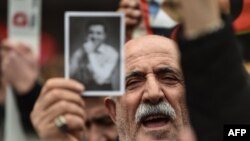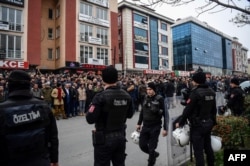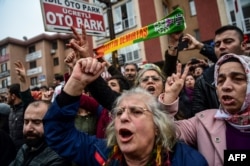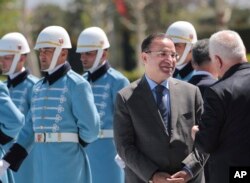The jailed head of Turkey's pro-Kurdish opposition appeared in court for the first time Friday since his arrest 14 months ago in a crackdown that followed a failed coup in 2016. Hundreds gathered outside the Istanbul courthouse, chanting slogans in support of Selahattin Demirtas.
The People's Democratic Party leader, who faces charges in 20 separate cases, was in court for "insulting the president." When asked to provide an address, Demirtas simply replied, "Turkish parliament."
Demirtas, a lawyer by training, challenged the court's jurisdiction in trying him and called for the case to be transferred to the higher constitutional court. The Kurdish leader also alleged that his parliamentary immunity had been violated. The hearing was quickly adjourned to May, to consider his demands, with the lower court ruling for his continued pre-trial detention.
Until Friday, he had not been allowed to attend 90 other hearings in the cases against him because of what authorities said were "security concerns."
The prosecution of Demirtas has drawn national and international criticism for his lengthy detention and what critics say is lack of evidence. Prosecutors allege he insulted President Recep Tayyip Erdogan for claiming Erdogan, along with Prime Minister Binali Yildirim, had "betrayed the country" over heightened tensions with Russia after Turkey downed a Russian bomber along the Turkey-Syria border in 2015.
The People's Democratic Party, known as HDP, contends the case is politically motivated.
"I am afraid the ongoing operation is part of a general and broader crackdown plan aimed at closing the democratic space for the HDP, in particular for the party spokesperson," said Ertugral Kurkcu, HDP parliamentary deputy. "The plan of the crackdown is to close forever a radical party for Kurds."
The HDP is Turkey's second main opposition parliamentary party.
Charges against HDP members
The HDP has been at the forefront of fighting for the rights of Turkey's large Kurdish minority and secured more than 5 million votes in the last general election. The government accuses the party of being linked to an ongoing insurgency by Kurdish rebel group the PKK, a charge the HDP strongly denies.
Since the declaration of a state of emergency following the 2016 attempted coup, nine HDP parliamentary deputies have been jailed, along with dozens of elected mayors and around 10,000 party officials. This month, prominent HDP parliamentary deputy Idris Baluken was sentenced to nearly 17 years in prison on terrorism charges.
Demirtas recently announced he was stepping down as leader, saying he believed he would not be released in the foreseeable future. The decision is seen as another blow to the HDP.
"Demirtas was extremely important for the HDP; he was an extremely bright man. He speaks well," said political scientist Cengiz Aktar, an expert on Kurdish issues. "He managed to attract not only Kurdish votes, but also Turks. He will be remembered as a historical breakthrough."
Observers say Demirtas was widely seen as the only political leader who could match the charisma of Erdogan, citing that as a key reason critics for Demirtas' detention. The Turkish government maintains the judiciary is independent.
Press freedom?
Questions about the independence of the judiciary were raised again Thursday, when the constitutional court ruled that the pre-trial detention of two journalists, Sahin Alpay and Mehmet Altan, had violated their rights and called for their immediate release. Two Istanbul courts, however, refused to implement the decision, saying they had not been officially notified.
The decision came as Deputy Prime Minister Bekir Bozdag criticized the constitutional court ruling. "When ruling on individual applications, the constitutional court cannot act like a super appeals court and cannot make rulings like such courts," he wrote on Twitter. "The constitutional court has overstepped the limit set out in the constitution and the laws."
The failure to release the journalists has been strongly condemned. "It is outrageous that the Istanbul high primal court is resisting against the constitutional court decision," said Erol Onderoglu, Turkey's representative to the Paris-based Reporters Without Borders.
"It illustrates perfectly the influence of political interference to the Turkish judiciary, even high judiciary organs are not independent to decide to safeguard fundamental values. It has turned to a deep political and judiciary crisis, once against illustrating the chaotic ground after the state of emergency and coup attempt," Onderoglu said.
He also said the constitutional court ruling will be used as a legal precedent for the release of the 150 other journalists being held. The court's decision had opened the door for their release.
Rebecca Harms, a member of the European Parliament, issued a statement describing the constitutional court ruling as a "milestone" for media freedom. Harms, however, condemned the failure to implement the ruling.
"If the lower courts do not respect the decision of the Turkish constitutional court, it will result in a further deterioration of Turkey's constitutional crisis and the erosion of rule of law and the separation of powers," wrote Harms.
Turkey's judiciary has faced unprecedented turmoil since the introduction of emergency rule. More than 4,000 judges have been removed from office, including two members of the constitutional court, as part of an ongoing crackdown against followers of U.S.-based Turkish cleric Fethullah Gulen. He is blamed for involvement in 2016 failed coup, an allegation he denies.
Observers say a decision on whether the constitutional court decision will be upheld is being viewed widely as a key test for the judiciary.







